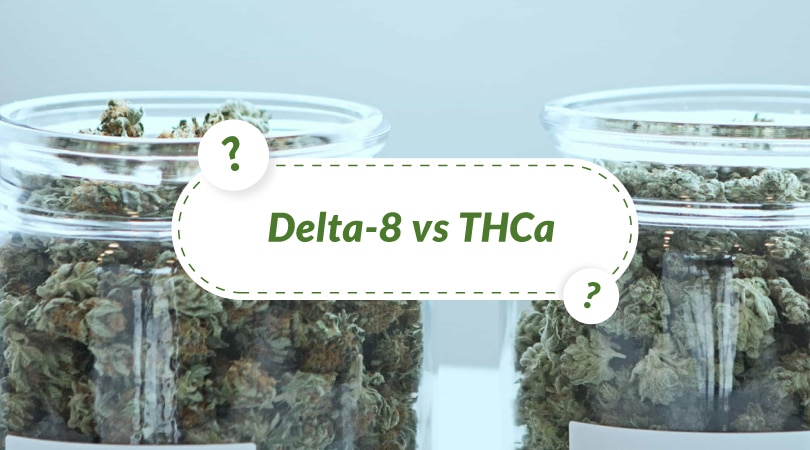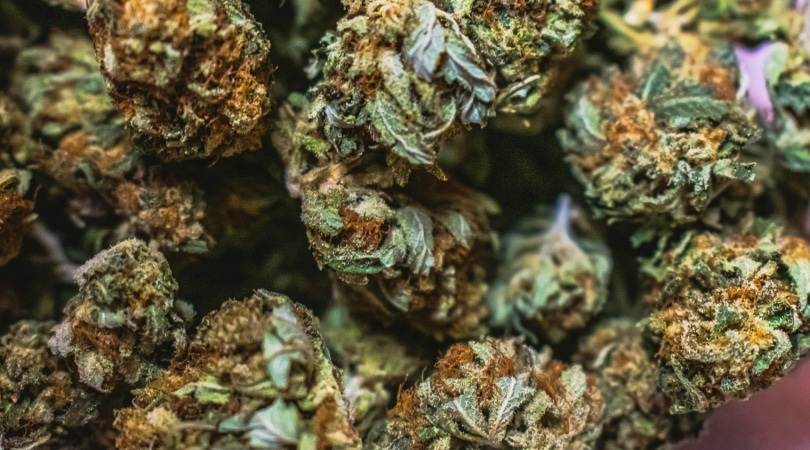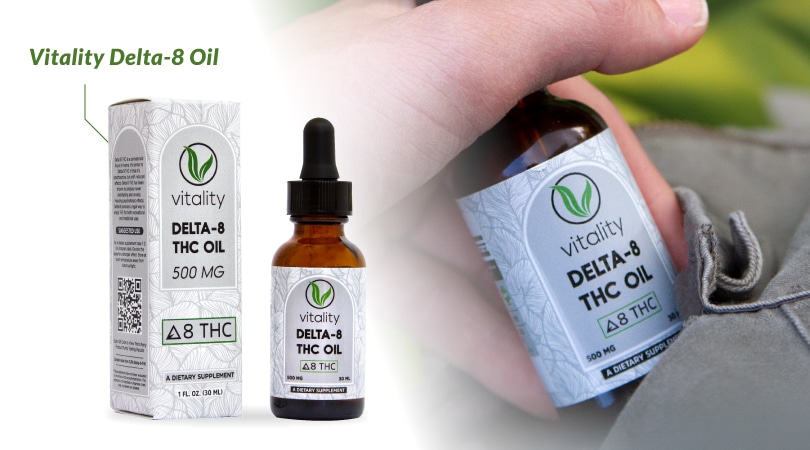
Delta-8 vs THCa: Which Is Right for You?
The world of cannabis is big and complex and can be confusing and even intimidating at times to understand what’s the best product for you. The cannabis plant contains more than 100 cannabinoids, each with its own special properties, and it’s important to understand them individually to fully grasp their potential effects and therapeutic uses.
Similar to how Delta-8 gained traction, THCa is now attracting attention within the cannabis community. However, if you want to decide which one is best for you, it’s crucial to understand the differences between Delta-8 and THCa, including their effects, potential benefits, and legal status.

What Is Delta-8?
You’ve likely heard about Delta-8 for its potential therapeutic properties and recreational use, but what exactly is it? Delta 8, scientifically known as Delta-8-tetrahydrocannabinol, is a minor cannabinoid found in cannabis.
On a chemical level, Delta-8 is an isomer of Delta-9-tetrahydrocannabinol (Delta 9 THC), the primary psychoactive compound in cannabis. This means it shares a similar molecular structure but with slight differences that influence its effects.
Delta-8 interacts with the body’s endocannabinoid system, particularly the CB1 receptors in the brain and central nervous system. Its interaction is believed to produce a milder psychoactive experience compared to Delta-9 THC, often described as calming and less anxiety-inducing.
What Is THCa?
THCa, or tetrahydrocannabinolic acid, is a non-psychoactive cannabinoid naturally present in raw cannabis. It serves as the precursor to THC, the compound responsible for the “high” associated with cannabis.
THCa itself does not produce psychoactive effects. However, when exposed to heat, light, or prolonged time, it undergoes a process called decarboxylation, converting it into THC.
Decarboxylation typically occurs when cannabis is smoked, vaporized, or cooked. This process removes a carboxyl group from the THCa molecule, transforming it into the psychoactive THC.
Where Does Delta 8 Come From?
While cannabis plants naturally produce Delta-8, they do so in very small quantities. Therefore, most Delta-8 products are manufactured through a chemical process. This process involves extracting CBD from hemp and converting it into Delta-8. This method is more efficient and cost-effective than relying on natural extraction. The resulting Delta-8 is then refined and tested for purity and safety.
Where Does THCa Come From?
THCa is a natural component of the cannabis plant, abundant in raw or freshly harvested cannabis flowers. Unlike Delta-8, THCa does not require synthesis, as it is naturally present in significant quantities.
However, to convert THCa into THC for psychoactive effects, it must undergo decarboxylation. THCa can be consumed in raw forms, such as in smoothies or tinctures; but is most often used smoked for its psychoactive effects.
Delta 8 vs THCa: Effects
- Delta 8 Effects: Delta 8 THC is psychoactive, meaning it produces a “high.” This high is generally described as milder and more clear-headed than that of Delta-9 THC (the primary psychoactive component in cannabis). Users often report feelings of relaxation, euphoria, mild pain relief, and increased appetite.
- THCa Effects (Pre and Post Decarboxylation): In its raw form, THCa is non-psychoactive. This means consuming it in its natural state will not produce a “high.” However, when THCa is heated (decarboxylated), it converts into THC. This is the key difference between Delta-8 and THCa in terms of psychoactivity.
- Pre-Decarboxylation (Raw THCa): No intoxicating effects. Some early research suggests potential therapeutic benefits without the high.
- Post-Decarboxylation (THC): Produces the well-known “high” associated with cannabis, including euphoria, altered perception, and potential therapeutic effects.
Delta-8 vs THCa: Potential Benefits
Delta 8
An online survey revealed that half of the participants used Delta-8 for its potential therapeutic benefits. These included:
- Anxiety or panic attacks (69%)
- Stress (52%)
- Depression or bipolar disorder (46%)
- Chronic pain (41%)
THCa
Preliminary studies suggest that THCa, in its raw form, offers a range of potential benefits, including:
- Metabolic Health: Studies suggest that THCa might aid in weight management and mitigate the impact of poor dietary choices on metabolic disorders such as diabetes.
- Neuroprotection: THCa may have neuroprotective qualities, potentially safeguarding the brain from damage.
THC (from Decarboxylated THCa)
When THCa is heated and converted into THC, its potential therapeutic benefits could include, according to a 2023 review:
- Chronic Pain Relief: THC is well-known for its potential analgesic (pain-relieving) properties.
- Reduced Inflammation: THC may help reduce inflammation throughout the body.
- Gastrointestinal Health: Endocannabinoids have long been shown to play a significant role in modulating gastrointestinal inflammation and mucosal barrier permeability. This suggests THC may have potential benefits for gastrointestinal diseases.
- Neurocognitive Support: THC may offer potential benefits for neurocognitive diseases like amyotrophic lateral sclerosis (ALS), multiple sclerosis (MS), Alzheimer’s disease (AD), Parkinson’s disease (PD), bipolar disorder, and schizophrenia.
Is Delta-8 Stronger than THCa?
Now the question is, ‘Is Delta 8 stronger than THCa?’ The answer isn’t straightforward because it depends on what you’re looking for, as they offer different experiences.
If you want a milder psychoactive effect with calming properties, Delta-8 is what you are looking for. However, if you’re seeking a more potent psychoactive experience, especially after decarboxylation, THCa is a great choice. These two cannabinoids are not mutually exclusive and can be used at different times depending on your needs and preferences.
Are Delta-8 and THCa Legal?
The legality of Delta 8 and THCa varies depending on some factors. Delta-8 is typically derived from hemp, making it legal under the 2018 Farm Bill at a federal level.
THCa’s legality depends on its source. In its raw, non-decarboxylated form, THCa is considered legal if derived from hemp. However, once decarboxylated into THC, it may fall under stricter regulations due to THC’s psychoactive properties.
Popular Ways of Consuming Delta 8
Delta-8 Oil: Delta-8 oil is typically taken sublingually (under the tongue) for fast absorption.
Delta-8 Shatter: Concentrated Delta-8 that is heated and inhaled.
Delta-8 Cartridges: Delta-8 distillate in vape cartridges for use with vape pens.
Delta-8 Flower: Hemp flower infused with Delta-8.

Popular Ways of Consuming THCa
Flower: Raw cannabis flower containing high levels of THCa.
Pre-Rolls: Ground THCa flower rolled into joints for smoking.
Vapes: Some vape products contain THCa that is decarboxylated upon heating.
Difference Between Delta 8 and THCa
| Feature | Delta-8 | THCa |
| Psychoactivity | Mild psychoactive effect | Non-psychoactive (raw); Psychoactive (heated) |
| Source | Derived from hemp or cannabis via synthesis | Naturally present in cannabis |
| Legal Status | Varies; often legal when hemp-derived | Varies; depends on decarboxylation and source |
| Potential Benefits | Anxiety, stress, pain relief, mild euphoria | Anti-inflammatory, neuroprotective, metabolic support |
FAQs
Can THCa or Delta 8 Show Up in Drug Tests?
Yes. Standard drug tests typically screen for THC metabolites, which can be present after using Delta 8. While THCa itself may not trigger a positive result, if any decarboxylation occurs (even during storage), it can convert to THC.
Are Delta 8 and THCa Safe?
Yes, both Delta-8 and THCa are generally considered safe, especially when sourced from a reliable store. However, it is best to talk to your doctor if you suffer from a medical condition before incorporating Delta-8 and/or THCa into your routine.
Does Delta-8 Interact with Medications?
Delta-8 may interact with certain medications. Always consult your doctor before use.
Is Delta-8 Psychoactive?
Yes, but its psychoactive effects are milder compared to Delta-9 THC.
Does THCa Get You High?
If you heat THCa, it will convert to THC, which is psychoactive. However, when raw, THCa doesn’t have any psychoactive effects.
Is THCa the Same as Delta-8?
No, THCa and Delta-8 are not the same. THCa is a non-psychoactive precursor to THC found in raw cannabis. This means that in its natural state, THCa will not produce the “high” associated with cannabis use. Delta-8 is an isomer of THC that is psychoactive, though less potent than the more common Delta-9 THC.
Users of Delta-8 report experiencing milder psychoactive effects, such as relaxation, euphoria, and pain relief, with less anxiety and paranoia compared to Delta-9 THC.
THCa, on the other hand, converts to Delta-9 THC when heated, a process known as decarboxylation, which is why smoking or vaping cannabis produces intoxicating effects.
Can I Use THCa and Delta-8 at the Same Time?
While there’s no known issue in doing so, it’s best to start with one at a time to understand how each affects you individually.
Conclusion
Both Delta-8 and THCa offer unique properties and potential benefits. Understanding the difference between Delta-8 and THCa is essential for making informed choices about which compound is right for you.
If you’re looking for a simple and accessible way to experience the potential benefits of hemp-derived cannabinoids, explore our range of high-quality Delta-8 products at Vitality. Visit our shop today to find the perfect Delta 8 product for your needs!
References
Kruger DJ, Kruger JS. Consumer Experiences with Delta-8-THC: Medical Use, Pharmaceutical Substitution, and Comparisons with Delta-9-THC. Cannabis Cannabinoid Res. 2023 Feb;8(1):166-173. doi: 10.1089/can.2021.0124. Epub 2021 Nov 19. PMID: 34797727.
Leinen ZJ, Mohan R, Premadasa LS, Acharya A, Mohan M, Byrareddy SN. Therapeutic Potential of Cannabis: A Comprehensive Review of Current and Future Applications. Biomedicines. 2023 Sep 25;11(10):2630. doi: 10.3390/biomedicines11102630. PMID: 37893004; PMCID: PMC10604755.
Palomares B, Ruiz-Pino F, Garrido-Rodriguez M, Eugenia Prados M, Sánchez-Garrido MA, Velasco I, Vazquez MJ, Nadal X, Ferreiro-Vera C, Morrugares R, Appendino G, Calzado MA, Tena-Sempere M, Muñoz E. Tetrahydrocannabinolic acid A (THCA-A) reduces adiposity and prevents metabolic disease caused by diet-induced obesity. Biochem Pharmacol. 2020 Jan;171:113693. doi: 10.1016/j.bcp.2019.113693. Epub 2019 Nov 9. PMID: 31706843.
Nadal X, Del Río C, Casano S, Palomares B, Ferreiro-Vera C, Navarrete C, Sánchez-Carnerero C, Cantarero I, Bellido ML, Meyer S, Morello G, Appendino G, Muñoz E. Tetrahydrocannabinolic acid is a potent PPARγ agonist with neuroprotective activity. Br J Pharmacol. 2017 Dec;174(23):4263-4276. doi: 10.1111/bph.14019. Epub 2017 Nov 2. PMID: 28853159; PMCID: PMC5731255.
